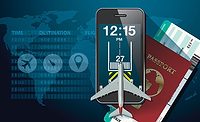Ensuring Safe International Travel for Women

It will come as no surprise that international travel poses a rapidly expanding number of risks for travelers. For women, the risks are magnified, especially in certain regions of the world. High-profile attacks on women in a number of countries reflect a general state of danger for female travelers.
In an increasingly challenging world, the most prepared organizations are providing tailored education and training for all of their employees, but especially their female international travelers. In fact, organizations which fail to meet their “duty of care” obligations to women travelers can expect to face significant liability.
Duty of care is the obligation an organization has to provide employees with the information, resources and accommodation necessary to ensure health, safety and security. As it relates to travel, duty of care clearly extends beyond the traditional workplace. Employers have been held responsible for failing to appropriately disclose the risks of travel, and for not providing suitable medical and security resources for employees away from home.
To address these needs, organizations are adopting travel risk and crisis management programs to protect themselves and their employees from global travel risks. A comprehensive program includes joint medical and security response, intelligence and travel tracking, enterprise communication tools and other critical services.
Key areas to consider include:
- Travel planning and pre-trip planning
- Communications planning
- Security posturing
- Transportation and lodging safety
- Medical situations/Crisis response
1. Travel Planning and Pre-Trip Planning
The importance of conducting area research cannot be overstated. Review maps before traveling to a new location. Obtain detailed information on specific areas and the neighborhoods in which crime is likely to occur. Stay current on global events that may impact your travel. Female travelers should also make note of major international hotels or key public locations where they can take refuge if they feel unsafe. Gain an awareness of the culture and customs of the region of travel, including local holidays, major events and local laws. Inconsequential things at home could be major infractions abroad.
Register with the U.S. State Department before your trip at https://step.state.gov/step/. Alert friends and family to your itinerary before departing for your trip, and notify them once you arrive. It should go without saying that you must have travel documents in order, ensuring that your passport is current (with expiration date well beyond the planned return date), and that necessary visas are acquired.
Travel planning should include instructions on medical preparations, including visiting a travel clinic four to six weeks prior to travel.
2. Communications Planning
Communications planning is a central but frequently overlooked aspect of international travel. It may sound simple, but travelers should be sure to bring a communication device that works. In addition to bringing a cellphone with overseas access (which should be tested to make sure it works in the particular country), a satellite phone or messaging device can be extremely important in remote areas of the world where there are no cellular networks. They can also save lives in an emergency or disaster where cellular networks become overloaded or disabled. Carry a portable battery charger or battery phone case. Know the local emergency assistance phone number and how to use the local phone system.
Test communication devices. Be sure that all devices are fully charged and carry appropriate international adaptors. Preload all emergency contact information, such as the U.S. Embassy, local contacts, home office contacts and traveling colleagues’ contacts. A printed copy of important phone numbers should be kept with you and at other locations, along with printed copies of email and Web addresses kept at multiple locations. Brief coworkers and family on your communications plan. Schedule an initial contact with your host upon arrival and regular contacts with your family and employer.
3. Security Posturing
Women traveling internationally, particularly first-time travelers, will benefit from understanding tactics for keeping a low profile. Avoid all aspects of an ostentatious lifestyle. Dress down and according to culturally acceptable standards in the region. Refrain from discussing information or interests that may raise your profile.
Awareness of basic self-defense approaches is important. Project an image of alertness. Walk with a purpose, and you’ll be less of a target for hustlers who prey on disoriented or timid tourists. If you are being followed on the street and feel threatened, duck into a shop and firmly tell the clerk: “I am a foreigner, and someone is following me. I am frightened and need help.” If need be, have the clerk call a cab or police officer for you.
Brush up on practical safety tips, including:
• Avoid telling strangers that you are traveling alone. Limit the knowledge of your travel and meeting schedules to those who need to know. When meeting people, especially strangers, do so only in the hotel lobby and not in your room or other secluded or remote locations.
• Try not to establish patterns such as leaving or returning to your hotel at the same time every day.
• Maintain “situational awareness” and avoid walking alone at night. Be sure to know when the sun rises and sets. Plan to be back to your lodging or in a safe, busy neighborhood by dark.
• Carry a whistle, small flashlight, ID, a small amount of cash, and a credit or ATM card on your person and not in your purse in case of theft.
• Do not accept food or drink from strangers; would-be criminals often try to drug their victims through food and drink consumption.
• Try to sit or stand next to other women or family groups in restaurants, on trains or buses, and in other public places.
In Muslim countries, there are additional considerations for women travelers regarding dress, culture and attitude toward women. Clothing that is fashionable and appropriate in the U.S. may project a provocative image in another culture. Modesty in dress is essential for women visiting Muslim countries, but conditions are not uniform. When in doubt, dress conservatively. The vast majority of men are respectful and courteous toward visitors, however sexual harassment and assaults can occur anywhere. Traveling with others, particularly a male, will greatly reduce the likelihood of sexual harassment.
Restrictions in some Middle Eastern countries can be particularly severe. Legally enforced bans in many countries include homosexuality, public displays of affection, wearing skirts above the knee, and social interaction between unmarried or unrelated men and women. Women traveling to Saudi Arabia, in particular, should be advised to be thoroughly familiar with culture and laws.
The dangers of kidnapping are important to review, depending on the region of travel. Express kidnapping has gained popularity in Central and South America. In these cases, the target is kidnapped and driven to an ATM and forced to make a withdrawal. Political or high-value target kidnapping is the most dangerous and resolution requires experienced kidnap and ransom negotiators.
4. Lodging and Transportation Safety
Multiple criteria should be considered when selecting a hotel. Identify at least three acceptable hotels in your location of travel. Avoid the regular use of the same hotel in any particular location. Choose a hotel with secure parking and one located in a well-populated area. Higher cost generally translates to a greater level of security.
Request a room using the following criteria:
• Located on the side of the hotel farthest from the front entrance
• Located above ground level but not higher than sixth floor
• Without a balcony, decreasing the number of entry points
• Not overlooked by another room
Upon arrival, make a point to speak with the concierge and review hotel safety procedures, familiarizing yourself with the hotel evacuation plan. Once in your room, identify a simple evacuation route in the event of an emergency. Lock the windows and door(s) using the double lock system. If available, use the security chain. Check to ensure that the telephone works. Never leave important documents such as passport, air tickets or money visible. Utilize the hotel or room safe when storing all unneeded personal documents and excess cash.
Transportation preparation is another crucial element of successful international travel. Have prior knowledge of the driver and vehicle, with an advance photo preferred. With taxis, pre-arranged is a best practice. Negotiate the fare prior to departure. Have a general idea of the route, use the GPS/mapping feature on your smartphone if you have one, and pay attention to surroundings. When using public transportation in an underdeveloped country, if possible, ride in the highest class available.
5. Medical Situations/Crisis Response
All travelers should be provided with information on handling medical situations. If you or a colleague experience a medical emergency, remember to remain calm and request assistance. Perform a minimum amount of care, but only if you are comfortable doing so. Notify local authorities and contact your company’s medical evacuation provider. Many organizations offer medical advisory services to travelers, so take advantage of this benefit, if possible. In the event of a disease epidemic, transportation may become difficult. If you become ill, expect to be quarantined.
In addition to medical emergencies, basic crisis response protocols should be outlined to travelers. For example, in the event of a bombing or terrorist attack, move to a safe area then contact your employer and family with your location/coordinates. Contact your employer’s security evacuation provider for security advice, whether to seek shelter in place or another course of action. In the case of riots or protests, avoid rallying points during times of civil unrest. If caught in a potentially violent situation, immediately seek shelter in upscale hotels or large public buildings, such as libraries, theaters, hospitals or museums.
Organizations can prepare for potential crises with traveler tracking and travel support programs. Real-time alerts for global events, mobile apps for real-time location tracking, and two-way messaging for maintaining contact with impacted employees are effective at managing a crisis. Beyond simple travel tracking, the latest tools for situational awareness offer intelligence – an analysis of the situation on the ground – overlaid with travel tracking.
Despite the challenges of global threats, enterprises can ensure safe and successful travel for women traveling internationally by providing tailored support and advice on international health, safety and security issues.
Looking for a reprint of this article?
From high-res PDFs to custom plaques, order your copy today!





